 Petzlover
Petzlover Rottweiler is originated from Germany but Puggle is originated from United States. Rottweiler may grow 31 cm / 13 inches higher than Puggle. Rottweiler may weigh 47 kg / 104 pounds more than Puggle. Rottweiler may live 4 years less than Puggle. Rottweiler may have more litter size than Puggle. Rottweiler requires Low Maintenance. But Puggle requires Moderate Maintenance
Rottweiler is originated from Germany but Puggle is originated from United States. Rottweiler may grow 31 cm / 13 inches higher than Puggle. Rottweiler may weigh 47 kg / 104 pounds more than Puggle. Rottweiler may live 4 years less than Puggle. Rottweiler may have more litter size than Puggle. Rottweiler requires Low Maintenance. But Puggle requires Moderate Maintenance
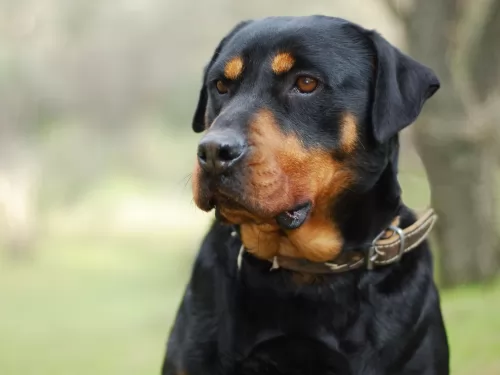 It is beleived to be the Rottweiler has been developed from the Roman cattle dogs. The Roman empire made a camp in a place at Germany in 74 AD. The area was called as 'das Rote Wil' and later as 'Rottweil'. In the middle ages Rottweiler was used in bear hunting and as a cattle dog. In 1899 the International club for Leonbergers and Rottweiler dogs was formed in Germany. In 19th century due to set in of railways the cattle was moved by railways and the need for the breed declined. When the world war was set in there came a heavy demand for police dogs. Rottweilers played a major role in first and second world war.
It is beleived to be the Rottweiler has been developed from the Roman cattle dogs. The Roman empire made a camp in a place at Germany in 74 AD. The area was called as 'das Rote Wil' and later as 'Rottweil'. In the middle ages Rottweiler was used in bear hunting and as a cattle dog. In 1899 the International club for Leonbergers and Rottweiler dogs was formed in Germany. In 19th century due to set in of railways the cattle was moved by railways and the need for the breed declined. When the world war was set in there came a heavy demand for police dogs. Rottweilers played a major role in first and second world war.
In 1921 many German Rottweiler clubs joined together to form ADRK, which is Allgemeiner Deutscher Rottweiler Klub. This is said to be the home club of Rottweiler. American kennel club recognised them in 1931. They become 9th most popular breed in America in 2013.
 The first Puggle was bred in the United States in the 1980s and was registered with the American Canine Hybrid Club.
The first Puggle was bred in the United States in the 1980s and was registered with the American Canine Hybrid Club.
None of the major kennel clubs recognize Puggles as a dog breed. The Puggle is a mix between the Pug and the Beagle, and is essentially a companion dog. Both the parent dogs are popular pets and each of the dogs - the Pug and the Beagle have their own histories.
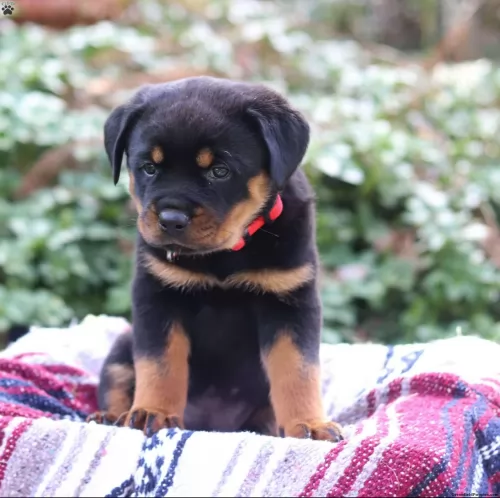 Rottweilers are good natured, obedient and are very much eager to work. They are calm, confident and an excellent watchdog. They will not make friends immediately. Rottweilers can be said as an all purpose dog since they are suitable as companion and watch dog as well. He is good in herding and guarding as genital feature. Rottweiler must be trained from its younger stage and should not be hit while training. They have high energy level and thus they are interested in doing work if properly trained. There are more possibilities of biting the strangers because of watchdog tendency.
Rottweilers are good natured, obedient and are very much eager to work. They are calm, confident and an excellent watchdog. They will not make friends immediately. Rottweilers can be said as an all purpose dog since they are suitable as companion and watch dog as well. He is good in herding and guarding as genital feature. Rottweiler must be trained from its younger stage and should not be hit while training. They have high energy level and thus they are interested in doing work if properly trained. There are more possibilities of biting the strangers because of watchdog tendency.
They are very good in herding sheeps as they have a natural gathering style. They are clever and adjusts the barking sound according to the situation. While herding they used to prove the leadership by selecting the dominant one in the flock and challenging it. If they were made to watch a same flock of cattle regularly, then they will develop a bond with them and will be affectionate with them as long as the cattle obeys its commands.
 The Puggle isn’t a purebred and he has short legs, a fairly thickset body, a crooked tail and medium length, floppy ears.
The Puggle isn’t a purebred and he has short legs, a fairly thickset body, a crooked tail and medium length, floppy ears.
The Puggle’s coat is short and smooth and the colors can be anything between fawn, white, tan with bi-coloring such as black and white or even tri-colored such as white, black and tan.
He may have the black mask like the Pug has or he may not. He stands in height between 25-38cm and weighs between 4 and 13kg.
The Puggle brings fun and games into every household with his bright, sociable personality. He gets on well with children and other dogs and makes a splendid pet and friend.
He is intelligent, albeit a bit stubborn too, but you can teach him some simple commands such as sit, stay and lie down. They are dogs which can adapt well to life in the city or in the countryside.
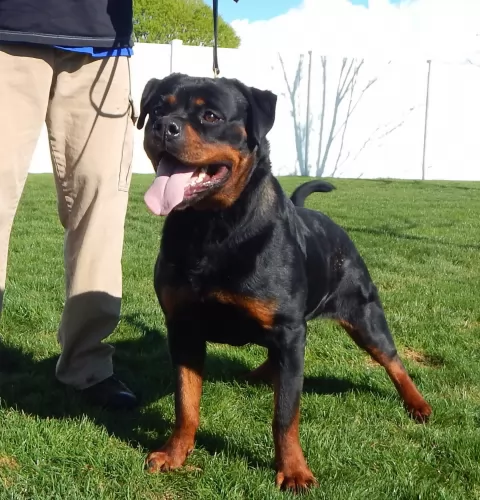 They are friendly with children and enjoy the company with them. But it is not advised to leave them with children without adult supervision.
They are friendly with children and enjoy the company with them. But it is not advised to leave them with children without adult supervision.
Rottweilers do not make friends immediately but take time to know about new people. He is an excellent watchdog. Males are quiet in nature but are watchful and females are more affectionate and obey some more. A good training is required for them to obey your orders.
They are not good for apartment life and thus a fenced back yard will be better for them to play and spend the energy. They require companion and will be happy to walk around with you. Hot weather will be some what better for them when compared with cold.
Rottweilers are easy to train because of their high intelligence. The training should be started in their young stage to have best results. They should not be dominated but treated kindly with understanding. They should be comfortable with the surroundings and people. Giving him a reward for training will make him interested in doing it. If he does a mistake then he should not be hit, so that he may get fear and loss his interest in doing it. Punishments will never work for them but rewarding will make him encouraged. Simple commands such as sit and stand shall be taught to them.
 Puggles are lively dogs who are always up for a game. They are affectionate and loving towards their human family and get on well with strangers too.
Puggles are lively dogs who are always up for a game. They are affectionate and loving towards their human family and get on well with strangers too.
They’re the kind of dogs who love a game outside but then are more than happy to cozy up on the couch with you.
Puggles love the attention of their family members and in exchange for your attention he is willing to shower you with his companionship and devotion.
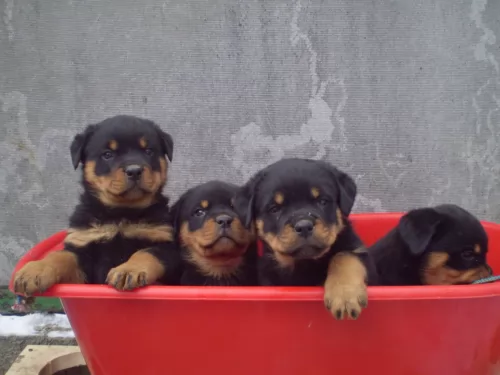 The health issues affecting the eyes of them are Cataract and Progressive Retinal Atropy. Health problems common in their joints are Hip Dysplasia, Elbow Dysplasia and Panosteitis. They also have chances to get circulatory system problems like Aortic Stenosis and Von Willebrand's Disease. Other common health problems in Rottweiler are Bloat and Cancer.
The health issues affecting the eyes of them are Cataract and Progressive Retinal Atropy. Health problems common in their joints are Hip Dysplasia, Elbow Dysplasia and Panosteitis. They also have chances to get circulatory system problems like Aortic Stenosis and Von Willebrand's Disease. Other common health problems in Rottweiler are Bloat and Cancer.
Mostly people think that Rottweilers don't shed but they are short haired dog and sheds more. They are having double coat that is undercoat and topcoat. The undercoat is softer and protects them in winter and topcoat is rougher and visible. It is said that they will shed in spring and winter seasons. Shedding can be reduced by brushing them.
 Your Puggle isn’t likely to get sick often if you feed him healthy food, you exercise him and provide him with a loving, caring home. However, every dog can become ill, and Puggles can battle with the likes of Cherry Eye, skin problems and Hip Dysplasia among other ailments too.
Your Puggle isn’t likely to get sick often if you feed him healthy food, you exercise him and provide him with a loving, caring home. However, every dog can become ill, and Puggles can battle with the likes of Cherry Eye, skin problems and Hip Dysplasia among other ailments too.
Because of the Pug being a brachycephalic breed, your Puggle might also battle with respiratory problems.
Hip Dysplasia is a common canine disease that has no respect for age or breed of dog. Even young dogs can develop this heritable condition where the thighbone doesn't fit properly into the hip joint. Dog have pain in one or both of the rear legs, and can become totally lame. Arthritis can also develop.
This is when the gland in the dog’s third eyelid bulges out as a red mass. It can be treated surgically.
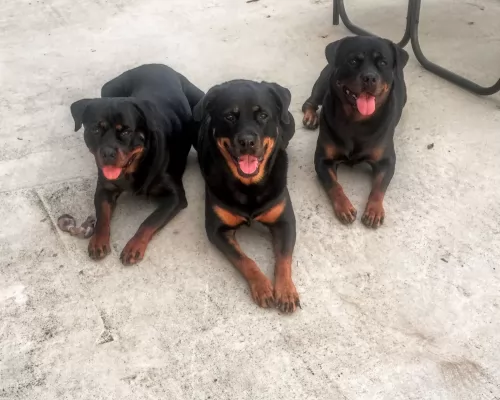 Rottweiler puppies should be given a diet which has protein, carbohydrates and fats. They need different diets in their growing stages. They can be given chicken with bones and vegetables for 4 days in a week. Beef with vegetables can also be given. When feeding them red meat a raw meaty bone can also be included. Fish oil can be given such that starting with 1000 mg and making it to 3000 mg in a time of two weeks.
Rottweiler puppies should be given a diet which has protein, carbohydrates and fats. They need different diets in their growing stages. They can be given chicken with bones and vegetables for 4 days in a week. Beef with vegetables can also be given. When feeding them red meat a raw meaty bone can also be included. Fish oil can be given such that starting with 1000 mg and making it to 3000 mg in a time of two weeks.
High calories of protein should be provided to them to meet their energy requirements. While buying commercial food it should be checked for the main ingredient to be meat. Protein levels should be more from animals than vegetables. High quality dairy products should be included. Food should not have low quality flavours and preservatives. Healthy fat is necessary for their skin and coat. If these fats are not provided it will cause dandruff and itchy skin.
Brushing them weekly once is recommended for their coat and skin. Buying the puppy from reputable breeder will be better. Vaccinations and preventive medicines should be given on right time. Spaying and Neutering should be done to avoid unwanted pregnancy. High quality diet should be maintained. Making them to bath once in a week is advisable. Nails should be trimmed once in every two weeks.
Rottweilers like to chase something and Laser pointer will be a good game for them. It will make them busy and also entertain us. But it should be on a limit and they should not get bored. A treat or toy can be hided and they can be made to find it. A bottle should be filled with water and frozen. The frozen bottle can be given to them for playing. In summer time it will make them very happy to play with it. A ball or toy can be thrown and they can be made to fetch it. Walking them is also a good exercise.
 The Puggle can settle into life in the city or the countryside as he doesn’t require too much exercise. That doesn’t mean however that you can just ignore his exercise needs, as doing so can make him overweight and unfit.
The Puggle can settle into life in the city or the countryside as he doesn’t require too much exercise. That doesn’t mean however that you can just ignore his exercise needs, as doing so can make him overweight and unfit.
Take him for walks and play games with him indoors as well as outdoors.
The Puggle, with his short-haired coat, is a low maintenance dog that is easy-to-groom. A good brush twice a week will be excellent for him.
A brushing session gives you a chance to look inside his ears for signs of redness and ear infections, to look at his eyes and have a good look inside his mouth. Bad teeth can cause pain but can also cause illness throughout the body.
Trim your dog's claws as well, because left too long they can hook on things and rip the flesh.
Our canine children rely on us for good food to stay healthy. Luckily, for convenience sake, there are excellent commercially manufactured dog foods on the market. The best ones ensure that your dog gets a good balance of vitamins and minerals.
However, you want to also provide your pet with some tasty home-made food too. Dogs thrive on simplicity and consistency, and home-cooked food twice a week and added to the dry kibble can keep him healthy and thrilled with his lot.
Boiled chicken, sweet potatoes, brown rice or pasta, carrots and spinach will be excellent for him – it is simple just as he likes it and it is nutritious. Chop the food up finely and add it into the dry kibble. Also, your Puggle will do well on some raw meat occasionally too as this keeps the skin free of rashes and free of infections.
Make sure he is never without a constant supply of fresh, cool water.